Housebreaking your dog isn’t the easiest task, to say the least.
But what’s even more frustrating is when a potty trained pooch mysteriously starts relieving himself indoors, seemingly out of nowhere.
This behavior can be traced back to a variety of causes including health problems, training issues, and social factors.
We’ll explain some of the most common reasons potty-trained dogs may have accidents and provide some helpful solutions below.
Key Takeaways: Why Is My dog Peeing on the Carpet?
- It’s not especially uncommon for adult house-trained dogs to have accidents or begin peeing indoors on a regular basis.
- It is always important to consult your vet if your dog begins routinely urinating indoors after being house-trained for a period of time. Several illnesses and medical conditions can cause these types of accidents to occur.
- Medical problems aside, dogs sometimes pee indoors because of mistakes made during the house-training process, anxiety, and lingering odors, among other things.
Leading Reasons Your Dog Is Peeing on the Carpet (and What to Do About It)
There are a variety of factors at play when it comes to improper elimination, which means there can be several different reasons your dog is peeing indoors.
We’ll discuss a few of the most common reasons below.
It’s always a good idea to have a potty-trained dog evaluated by a veterinarian anytime accidents start happening. This will help ensure the problem isn’t a sign of an underlying medical condition.
1. Your Dog May Be Suffering From A Medical Issue
If your dog was previously house trained, eliminating improperly may be a sign of a medical issue.
This is why it’s important to go see a veterinarian if Fido starts peeing indoors.
While every dog and situation is different, some of the most likely medical causes could be:
- UTI — Urinary tract infections, or UTIs, are more common in female dogs, though they can occur in male dogs as well. In addition to eliminating improperly, you might also notice your dog needing frequent bathroom breaks, you may see blood in the urine, or you may notice a strong odor.
- Incontinence — Incontinence is when your pet has an involuntary leakage of the bladder. In such cases, your doggo may release urine while resting, and might not be aware that he’s tinkling. Incontinence is most common in older dogs, but it can happen in dogs of any age.
- Kidney Problems — Eliminating inside the house can also be a marker of kidney issues. This not only includes kidney stones, but kidney infections too.
If your dog is struggling with a medical issue, you may want to use doggie diapers or belly bands while you’re working on a solution to the problem. This will at least limit the messes you’ll have to clean up in the meantime.
2. Your Dog Was Never Properly Potty Trained
Many dogs start having accidents because they were never truly house trained. But that’s not a problem — you can always go through the process again.
House training your dog is often a long and tiring task, but it’s just part of the pet-parenting gig. Depending on your dog, the entire process can take anywhere from a couple of months to a year or more.
It simply takes time for doggos to fully understand the concept of pooping and peeing outside.
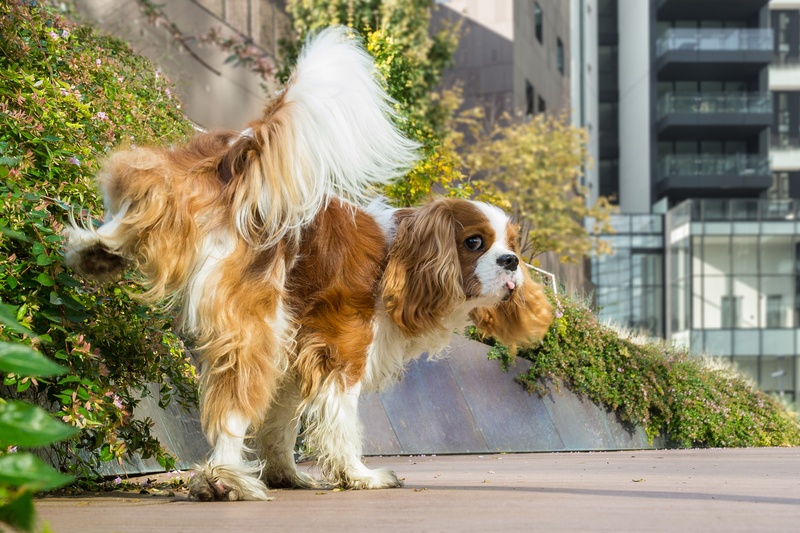
Potty training your pooch can also be especially challenging if you rescue an older dog who has never been properly trained.
Create a Realistic Potty Schedule
In order to help get your doggo back on track, commit yourself to a regular feeding and elimination schedule.
A puppy can generally control his bladder for one hour for every month of age. Therefore, if your pooch is 3 months old, he’ll need to be taken out every 3 hours, or you’re essentially guaranteed to find yourself cleaning up a mess.
Older doggos can wait much longer between bathroom breaks (many routinely “hold it” for 10 to 12 hours during the night without issue).
However, if your pooch is having accidents, you’ll want to make your walks or trips outside more frequent until you get things back under control.
Also, be sure to take note of what time your dog’s accidents occur. If it’s consistently around the same time every day, you’ll want to adjust your potty break schedule to reflect that.
Don’t Punish Your Dog For Accidents
Make sure that your dog is properly praised after eliminating outdoors, but don’t punish your dog when he has an accident indoors, as this is rarely productive.
Consider Teaching Your Dog How to Signal That It’s Potty Time
It can also be helpful to teach your dog to use “potty bells” or a dog doorbell to communicate that he needs to go outside. However, this is more of a long-term strategy.
While re-training your dog about the pooping and peeing protocols, you’ll want to take him out frequently enough that the bells are unnecessary.
3. Your Dog Is Stressed Or Anxious
Sometimes, dogs will improperly eliminate because of stress or anxiety.
If your dog is prone to these behavior challenges, you may need to give him more frequent opportunities to go outside. But you’ll also need to address your dog’s anxiety to stop the accidents entirely.
This also emphasizes the importance of positive-reinforcement while house training.
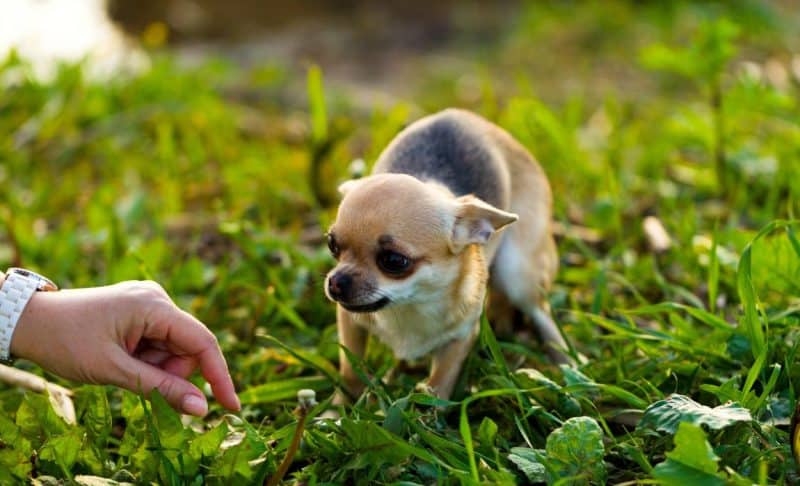
Punishing your dog after eliminating indoors doesn’t make him more likely to go outdoors. Your dog likely won’t make the connection between punishment and potty training.
Instead, it will only make your dog more anxious about eliminating at all, which is definitely counterproductive.
While committing yourself to frequent potty breaks, you’ll also want to identify your dog’s source of stress.
Some common causes may include:
- Separation Anxiety — If Fido has separation anxiety, he may be more likely to eliminate inside when you’re not home. Check out our complete guide to canine separation anxiety to learn some solutions and coping strategies.
- Other Pets or New Pets in the Family — Any change in a dog’s lifestyle, especially the addition of new family members, can lead your pooch to act out of the ordinary. So, be sure to introduce your dog to new people or new pets properly.
- Relocation — Changes to your dog’s everyday life can interfere with how he eliminates or acts in general. This is why your puppy may be a perfect angel at home but may have trouble listening to commands while on vacation. If you’re traveling with your four-footer or you just relocated to a new area, it may take your dog some time to adjust before he’s back on his proper potty schedule.
- Changes in Your Daily Routine — Dogs thrive on routines. Therefore, even a small change in your dog’s schedule can lead to improper potty practices. Try to keep your dog’s days as consistent as possible, especially during the potty training process.
- Fear of the Outdoors — Some dogs are too afraid of the outdoors to go potty outside, while other dogs won’t pee while on a leash because they aren’t used to having a leash on and are terrified! Take it nice and easy with these dogs, working on slow and gentle desensitization to the environment or equipment that is scaring them.
Some owners have found that CBD oils and treats are helpful in addressing their dog’s anxiety.
You can learn more about these products in our guide to the best CBD oils for dogs.
4. Marking Behavior
Sometimes dogs will urinate for territorial reasons. While it is more common in male dogs, some female dogs will engage in marking behavior too.
Neutering or spaying your dog may help reduce this tendency, but neither is a magic bullet; you’ll likely have to put in some work to correct the problem.
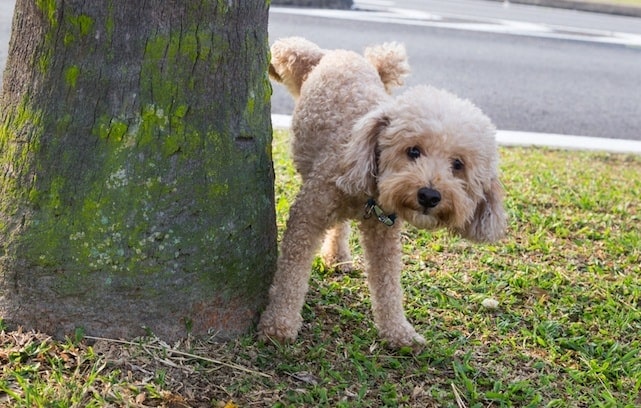
Ultimately, you’ll want to supervise your dog and redirect the behavior outside whenever he indicates that he’s going to mark.
If you catch your dog in the act, you can make a noise like a clap to interrupt the behavior. After the fact, clean the area thoroughly and focus on taking your dog out at more frequent intervals. Make sure you praise Spot heavily when he eliminates properly outside.
It may be helpful to have a secure crate available or a safe, confined area for your dog for when you can’t give him your full attention.
You may also find that potty-training sprays are helpful for deterring dogs from marking indoors.
5. Excitement Urination
If Fido tinkles the minute you step foot in the door or when company comes over, he’s probably urinating out of excitement.
The best thing you can do in this scenario is by waiting to greet your dog until you’ve made a quick pit-stop outdoors.
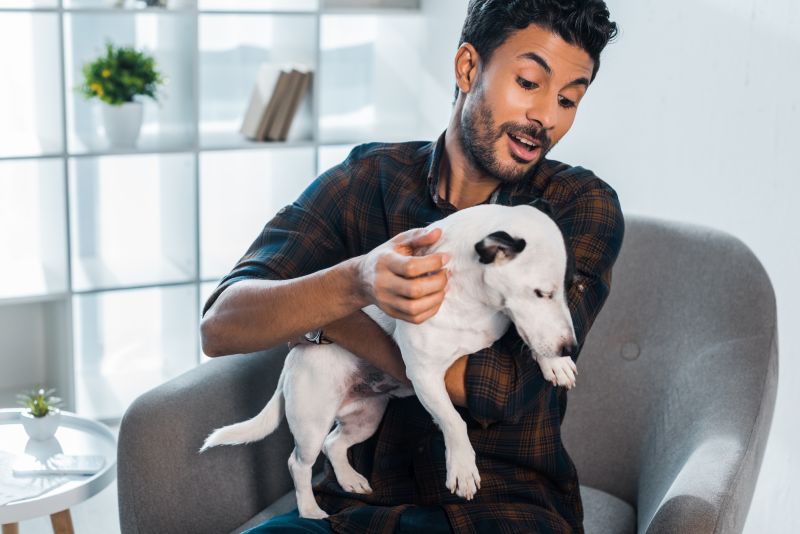
It can also be helpful to make greetings a calmer experience altogether. This isn’t always easy, but if you’re successful, you’ll see far less sprinkling when you return home from work or school.
Try to get in the habit of calmly entering and exiting your home to keep your pooch’s excitement level lower.
Pet Fido only after he’s been acting cool and collected for a couple of minutes. Engaging in this practice can also help your pooch learn to cope with the excitement more effectively.
6. Submission Urination
Some dogs might have a tendency to urinate in the presence of dominant dogs or assertive humans.
Such dogs are often shy or timid, and it’s up to you to help them build up their confidence to reduce this behavior as much as possible. If you’ve yelled at your dog and they peed as a result, your dog is likely quite afraid of you! Show your pup that he can trust you and has nothing to be afraid of.
Some things you can do include:
- Focus On Positive Reinforcement — Your dog is likely unclear about his routine and the best way to behave. That being said, it’s imperative that you train your pooch only using positive reinforcement training techniques. You’ll also want to gradually introduce him to other trusted people and dogs to build up his confidence.
- Don’t Scold — As frustrating as the potty training process can be, refrain from negatively reacting around your pooch. This is counterproductive, it can cause anxiety, and it can weaken your bond with your buddy.
- Keep Introductions Calm — When introducing your dog to other dogs or people, be sure to do so outdoors in a safe, calm environment. Make sure to introduce new things gradually and go at your dog’s pace so that he can build up the confidence he needs. Also, try your best to eliminate loud noises or quick movements. Praise your dog with scratches or treats when he displays the desired behavior.
- Stick To A Routine — Sticking to a routine will give your pooch a sense of certainty, which can help him build confidence. Also, try to engage in fun training sessions on a regular basis.
7. Improper Cleaning
It’s possible that your dog smells his old pee on the carpet from past accidents.
Dogs are inclined to pee whenever they smell urine, so thorough cleaning is an absolute necessity. You’ll want to use an enzymatic carpet cleaner for urine or — at the very least — a carpet deodorizer to fully break down your dog’s lingering pee stain.
Not sure where your dog peed? A UV light designed to detect dog urine can illuminate exactly where your dog has tinkled, helping ensure that you clean all the right areas.
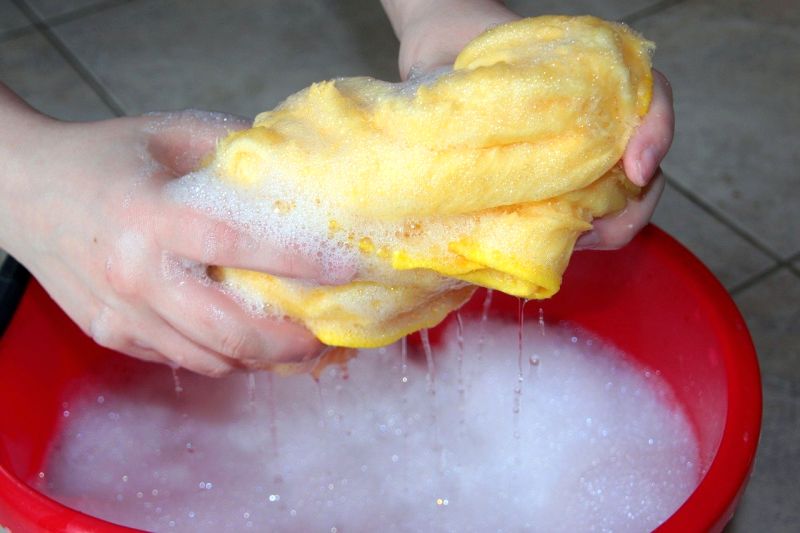
This way, your pooch will be less inclined to eliminate in the same spot in the future.
If you continue to see your dog returning to the same spot even after cleaning, take him outside immediately as soon as he’s heading towards that area.
Check out our guide to eliminating pet odors to learn some additional tips for neutralizing the smell of urine.
Breeds Prone To Potty Problems
Although you can (and should) house train any breed, some are notoriously difficult in this regard. Some of the worst offenders include:
- Afghan hound
- Basset hound
- Beagle
- Bichon frise
- Bulldog
- Chihuahuas
- Chow
- Cocker spaniel
- Dachshund
- Dalmatian
- Jack Russel terrier
- Maltese
- Pekingese
- Pomeranian
- Pug
- West Highland white terrier
- Yorkies
Generally speaking, toy breeds and terriers are often the most challenging to house train. This might just mean that your dog will need more repetitions before fully getting a grasp on potty training.
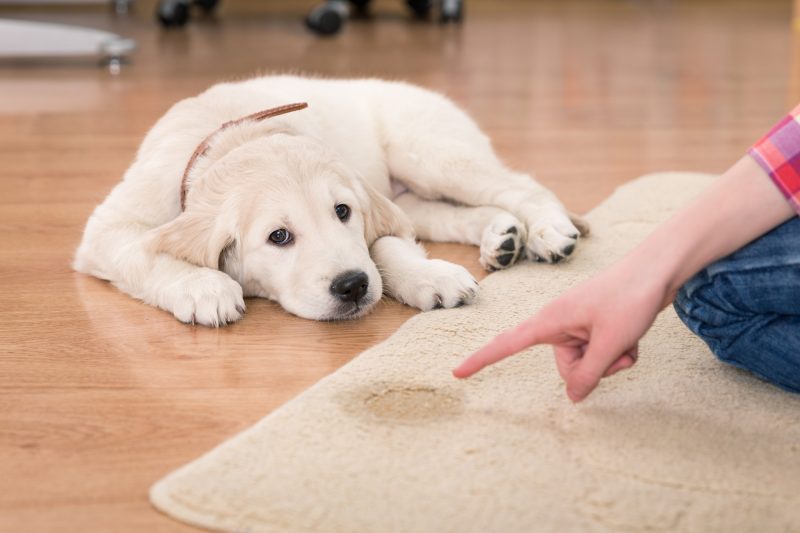
Additional General Tips for Preventing Indoor Accidents
Here are a couple of additional ways to prevent indoor accidents:
- Take Walks More Frequently — If you find that your dog simply can’t hold his bladder, you’ll need to increase the frequency of his walks. Younger dogs and small dogs (who have smaller bladders) may need to go out every two to three hours. You may also need to increase the duration of your walks to give Spot more chances to sprinkle.
- Exercise Patience, Practice, and Praise — Don’t forget to praise Fido heavily whenever he eliminates outside. This process will take lots of patience and dedicated repetition, but in time it will be well worth it.
- Supervise — Until your dog gets a full understanding of potty training, he will need to be heavily supervised. Be sure to pay extra attention to your dog when he is “full”, meaning two to three hours after his last elimination and following meals. Also, be aware that activities like playing, running, or waking up from a nap can trigger urination.
- Stay Positive — Dogs need positive reinforcement in order to develop a full understanding of potty training. Yelling or scolding your dog is not helpful and will only serve to weaken your bond.
- Keep a Potty Log — Sometimes, logging when your dog eliminates can be helpful in identifying your dog’s potty patterns. For example, maybe you notice that your dog pees consistently after playing a game of fetch, or right around noon every day. You can use this information to inform how often and when you take your dog outside to eliminate.
- Find a Good Trainer — If you’re at your wit’s end or nothing seems to be working, investing in a great dog trainer can be well worth your time. Trainers can help you direct your potty training strategy based on your dog’s individual needs.
- Use a Deterrent — If your dog is constantly eliminating in the same spot, you can purchase a deterrent to help them recognize where you don’t want them to eliminate. Some owners even use diluted white vinegar or lemon juice as a DIY option.
***
Potty training (or re-training) can be a trying process even for the most experienced dog owners. Above all, be patient, and in time your dog will learn exactly where to eliminate.
Have you experienced any potty training challenges? What strategies work best for you and your pooch? We’d love to hear all about it in the comments below!


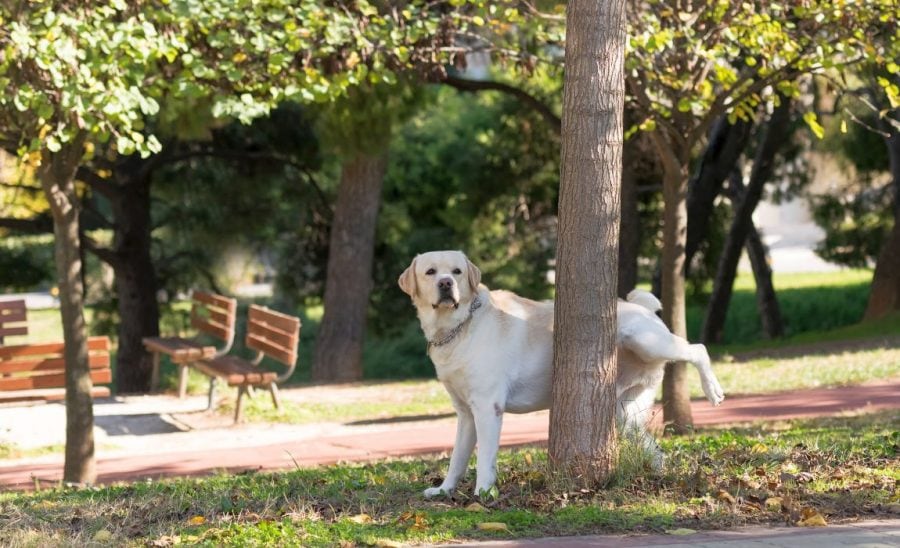



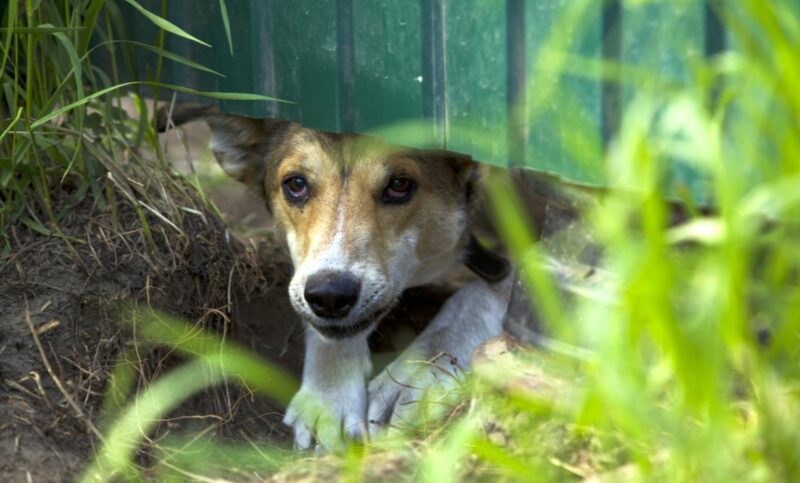

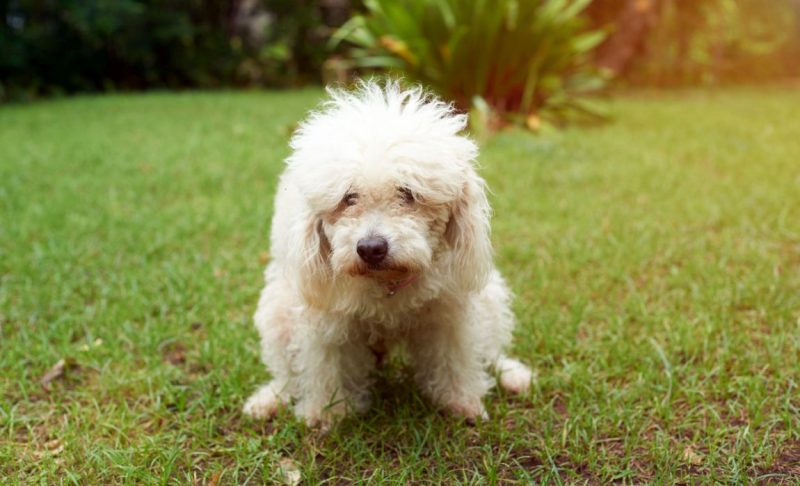
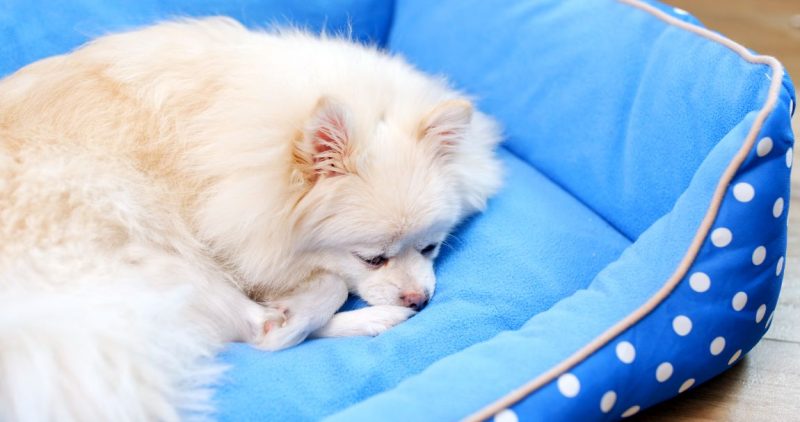
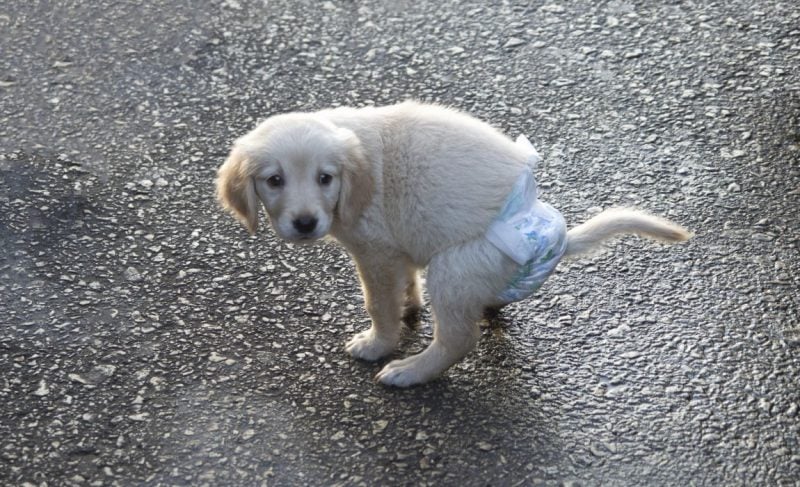


Leave a Comment